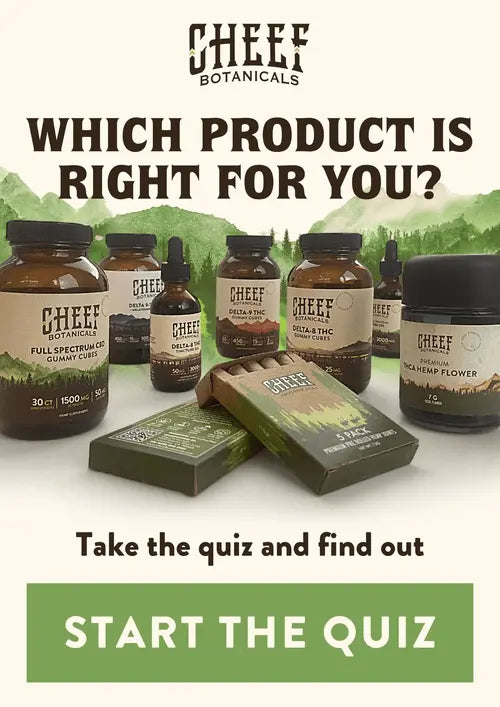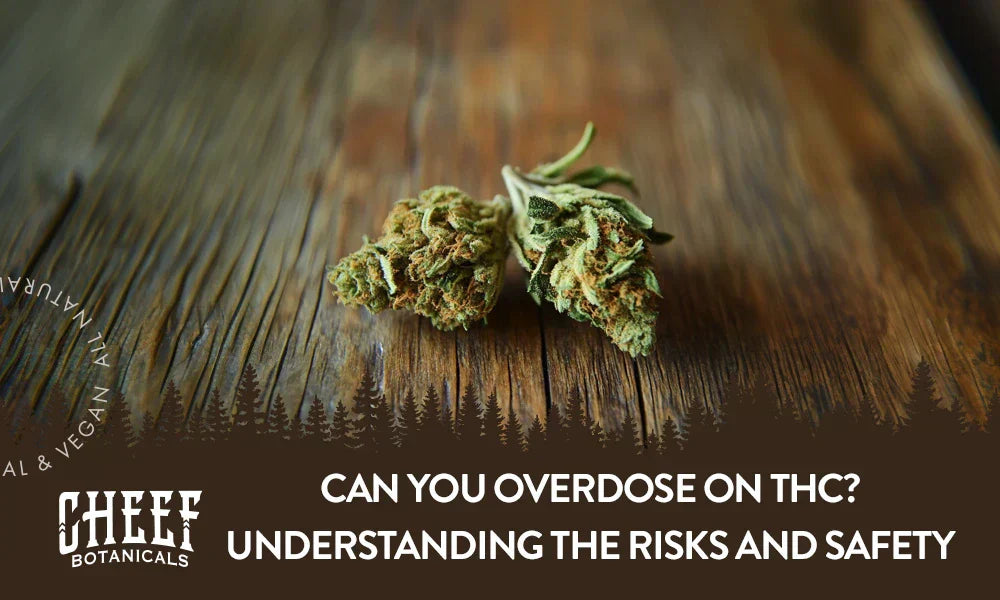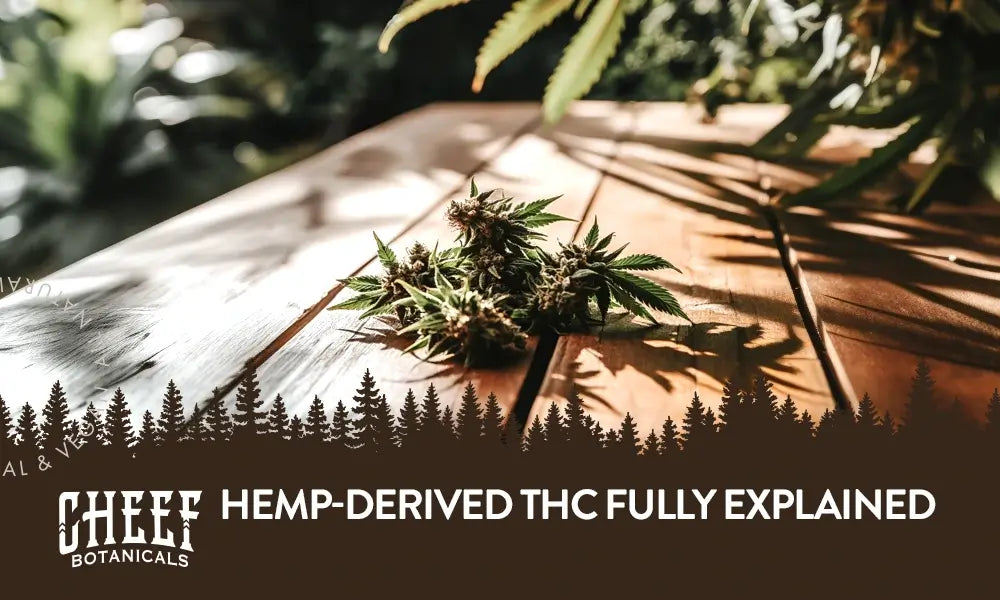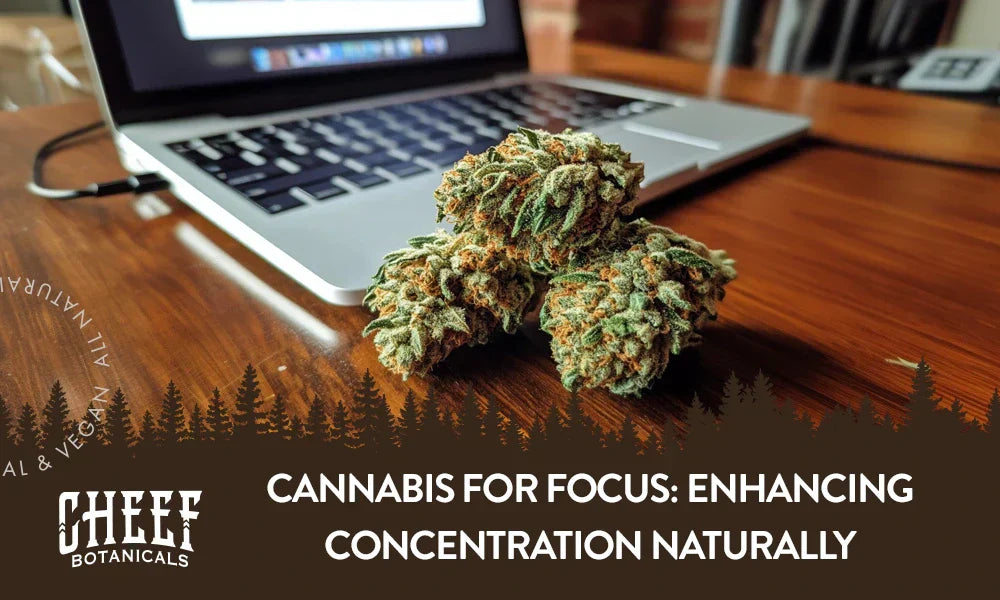Can you overdose on THC? It's a question many cannabis consumers have asked, especially after a bad experience with too much THC. While a THC overdose won't be fatal like opioids or alcohol, it can definitely make you feel awful.
Dizziness, paranoia, chest pain, or even mild hallucinations—consuming too much cannabis can turn a relaxing session into a full-blown nightmare. But what actually happens when you go overboard? And how does it compare to other substances?
Read on to find out what happens when you take too much THC and how to handle it.
What Is THC and How Does It Work in the Body?

Tetrahydrocannabinol (THC) is the compound in cannabis that produces its well-known intoxicating effects. By interacting with cannabinoid receptors, THC can alter mood, change perception, heighten heart rate, and increase appetite.
The body has a built-in endocannabinoid system, which helps regulate things like mood, sleep, and appetite. Overconsuming cannabis can flood this system with high amounts of THC, leading to sensations that can be fun—or overwhelming if you go overboard.
Can You Overdose on THC? The Facts
The idea of a THC overdose sounds dramatic, but it's not the same as a life-threatening overdose. Consuming too much THC won't shut down your breathing or stop your heart, but it can still trigger intense adverse effects. Some people experience panic attacks, chest pain, nausea, or even hallucinations when they overdo it.
The overdose risks increase with edible cannabis products since their effects take several hours to kick in, making it easy to consume too much. With edibles, you also consume and metabolize all the THC instead of blowing some out like when smoking or vaping. While fatal overdoses from THC alone are rare, combining it with other substances, like alcohol, could lead to more serious health effects.
What Does an Overdose of THC Mean?
A THC or marijuana overdose happens when someone consumes too much THC, leading to overwhelming effects that can feel intense and uncomfortable. Unlike symptoms linked to illegal drugs, a THC overdose doesn't cause fatal results, but it can still send someone to the emergency room.
Some people may experience heavy intoxication, leading to paranoia, dizziness, or a racing heart. Newbies have a higher risk due to their low tolerance levels and lack of dosing knowledge or experience. Overconsumption more often happens with edible products, since they take longer to kick in.
Symptoms of THC Overdose
A THC overdose can feel overwhelming, but the effects depend on how much was consumed, the method of consumption, and individual tolerance. Here are some common symptoms and what they mean.
- Panic Attacks. Too much THC can send the nervous system into overdrive, leading to racing thoughts, increased risk of paranoia, and difficulty calming down.
- Chest Pain. Some people experience tightness or chest pain, often due to heightened anxiety, increased blood pressure, or heart rate.
- Hallucinations. High doses may cause intoxication, where sights and sounds feel distorted, leading to confusion or distress.
- Nausea and Vomiting. Consuming THC in excess can trigger queasiness, especially with edible cannabis products, which take longer to digest.
- Dry Mouth and Dizziness. Dehydration is common, and dizziness can occur due to blood pressure changes, making it hard to stand or focus.
- Extreme Drowsiness. Some may feel overwhelmingly sleepy, especially with high doses of edible products, leading to heavy fatigue.
While uncomfortable, these symptoms usually pass within hours or less. However, if the effects become severe, it's best to seek medical attention.
Common Signs of THC Overdose in Adults
Too much THC can hit hard, and the signs are tough to ignore. While it's not the same as a life-threatening overdose, consuming excessive amounts can lead to intense adverse effects. Some people feel panic attacks creeping in, while others experience extreme confusion or intoxication.
Physical Symptoms of THC Overconsumption
Overdoing THC doesn't just affect the mind—it can bring on some uncomfortable physical effects. Here's what to look out for:
- Dry Mouth. A parched feeling that won't go away, no matter how much water you drink.
- Chest Pain. Feels like tightness or pressure, sometimes mistaken for a heart attack.
- Dizziness. Standing up too fast? That woozy feeling might hit hard due to changes in blood pressure.
- Nausea or Vomiting. Too much THC can upset the stomach, especially with edible cannabis products.
- Rapid Heartbeat. The nervous system goes into overdrive, making the heart race.
- Extreme Fatigue. Heavy drowsiness can set in, making it difficult to stay awake or focus.
Psychological Symptoms and Behavioral Changes
THC overconsumption doesn't just affect the body—it can take a toll on your mind, too. Some effects can feel intense, especially for those with a lower tolerance or higher risk factors.
- Panic Attacks. Overwhelming anxiety, racing thoughts, and a sense of impending doom.
- Hallucinations. Seeing or hearing things that aren't real due to high psychoactive ingredient levels.
- Paranoia. Feeling suspicious, nervous, or convinced something bad is happening.
- Confusion and Disorientation. Trouble thinking clearly or keeping track of time.
- Mood Swings. Sudden changes in emotions, from laughter to unease.
- Social Withdrawal. Avoiding conversation and feeling the need to be alone.
Overdoing it with edible cannabis products is common since they take several hours to kick in, leading to accidental overconsumption. If symptoms feel overwhelming, it may be time to seek medical attention.
Factors That Affect THC Overdose Risk
Not everyone reacts to THC the same way. Some can handle a heavy dose, while others feel the effects after just a little. Several factors influence overdose risks, from dosage and potency to individual tolerance and the way THC is consumed.
- Dosage and Potency of THC Products. Stronger products with more THC can lead to intense intoxicating effects, especially for those with lower tolerance. Edible cannabis products and concentrates often contain high THC levels, increasing the risk of overconsumption.
- Individual Factors: Tolerance, Weight, and Metabolism. A person's tolerance plays a huge role in how THC affects them. Those with chronic marijuana use may handle more, while newcomers are more sensitive. Weight and metabolism also impact how quickly THC effects kick in.
- Method of Consumption and Its Impact. Smoking THC delivers effects quickly, but edible products take several hours to peak. The delay of edibles can lead to too much THC intake, as people mistakenly consume extra before the first dose hits. With smoking, vaping, or dabbing, the effects can hit fast and hard, which can be overwhelming for some, especially those who are inexperienced.
How to Avoid Overdosing on THC
Too much THC can turn a fun experience into a not-so-great time. The good news? Avoiding a weed overdose is easy with a little caution. Understanding dosage, product potency, time of effects, and responsible consumption makes all the difference.
Whether you're new to cannabis use or have a higher tolerance, knowing your limits is key. Let's break down how to consume THC safely, from finding the right dose to choosing the right cannabis products for your needs.
Start with a Low Dose: Finding the Right Amount for You
If you're new to THC or trying a new or stronger product, start low and go slow. Edible cannabis products take several hours to fully kick in, so patience is key. Inhalable products can hit quickly so proper dosing is important for all consumption methods.
Dosing varies based on tolerance, metabolism, and product strength. A low dose for one person may feel overwhelming to another. Taking too much can lead to panic attacks, dizziness, or nausea. Avoid the overdose risks by beginning with a small amount and waiting before taking more THC.
Using THC Products Responsibly
Responsible cannabis use is the best way to avoid adverse effects. Different products have different strengths, and smoking THC hits faster than edible cannabis. That's why it's crucial to understand how long it takes for effects to show up.
Mixing THC with drugs, alcohol, or medications can increase health effects and overdose risks. It's also important to consume in a comfortable setting, especially for those prone to marijuana intoxication or panic attacks. Be mindful of your body's response and adjust as needed.
Related Post: Do THC Gummies Expire or Go Bad?
Importance of Knowing Product Potency
Not all THC products are created equal. Some contain more THC than others, leading to a higher risk of overconsumption. Edible products, concentrates, and synthetic cannabinoids tend to be stronger and require careful dosing.
Labels often indicate THC potency, but factors like tolerance and metabolism affect how intensely you feel the effects. Checking the strength of cannabis products before consuming helps prevent uncomfortable experiences like chest pain, hallucinations, or extreme drowsiness. Beginners should start with 2.5mg to 5mg of edibles and then gradually work their way up to a comfortable level. Knowing what you're taking is the first step to avoiding an overdose.
Featured Products: Cheef Botanicals THC Edibles

Looking for a tasty way to enjoy THC? Cheef Botanicals' Delta 8 and Delta 9 Gummies deliver delicious flavors with a smooth, uplifting experience. Whether you're winding down or sparking creativity, these gummies offer pre-measured doses for easy and reliable enjoyment.
- Delta 8 Gummy Cubes. These fruity, cruelty-free gummies provide a mellow, euphoric lift. Available in various strengths, they're perfect for relaxation and mood enhancement.
- Mixed Berry Delta 8 THC Gummies. A delicious berry blend that brings calm and clarity. Best enjoyed in the evening to ease into deep relaxation.
- Tropical Delta 8 THC Gummies. Bursting with natural tropical fruit flavors, these gummies offer a smooth, mood-lifting effect.
- Delta 9 Gummy Cubes. With a mix of CBC, CBG, and CBN, these provide controlled euphoria and complement your mood.
- D9-THC Live Resin Gummies. Featuring live resin for extra potency, these gummies offer a stronger, full-spectrum THC experience with a rich terpene profile.
What to Do If You Think You've Overdosed on THC
Feeling like you've had too much THC? Don't panic—while a THC overdose can be intense, it's not really life-threatening. The best approach is to stay calm and find ways to relieve symptoms. Most effects wear off in several hours, but knowing how to handle the situation can make a huge difference.
Let's break down immediate steps to take, when to seek medical attention, and how to prevent overdose risks in the future.
Immediate Steps to Take
A THC overdose can feel overwhelming, but there are simple ways to ease the discomfort. Here's what to do if marijuana's effects hit harder than expected:
- Find a Safe, Comfortable Space. Anxiety and panic attacks are common, so move to a quiet, familiar place where you feel secure.
- Stay Hydrated. Drinking water helps with dry mouth and may ease dizziness or nausea caused by marijuana intoxication.
- Try Deep Breathing or Distraction. Slowing your breathing can help lower blood pressure and calm racing thoughts. Listening to music or watching a show can take your mind off the discomfort.
- Eat a Light Snack. Some foods, like citrus or black pepper, may help relieve symptoms by interacting with the nervous system and counteracting intoxicating effects.
- Avoid Mixing with Other Substances. If you've also consumed alcohol or other drugs, the overdose risks increase. Keep track of symptoms and stay alert for any worsening effects.
- Give It Time. The effects of edible cannabis products last longer than smoking, so be patient. Most symptoms peak within several hours before gradually wearing off.
When to Seek Medical Attention
Most cases of too much THC consumption can be managed at home, but some situations require medical help. If any of the following occur, seek medical attention immediately:
- Severe Chest Pain. If it feels like a heart attack, don't ignore it. In higher amounts, THC can cause changes in blood pressure and heart rate.
- Extreme Confusion or Hallucinations. If you're experiencing intense paranoia, disorientation, or hallucinations, a trip to the emergency room may be necessary.
- Uncontrollable Vomiting. If nausea and vomiting occur often, it could be a sign of excess THC intake, particularly for those who consume cannabis products regularly.
- Respiratory Depression or Loss of Consciousness. If breathing becomes slow or shallow, or if someone loses consciousness, call for medical emergencies right away.
While a fatal overdose from THC alone is rare, it's always better to be safe. When in doubt, get help.
Can THC Overdose Be Life-Threatening?
A THC overdose can feel intense, but can it be life-threatening? Unlike opioids or alcohol, fatal overdoses from THC don't actually exist. There have been very few deaths involving extreme THC consumption, but these rare occurrences included other complications. However, too much THC can still trigger severe health effects, especially for those with underlying conditions.
High doses may cause chest pain, panic attacks, hallucinations, or high blood pressure. The risks increase when THC is mixed with other drugs, alcohol, or medications. While most symptoms wear off within several hours, anyone experiencing extreme confusion or difficulty breathing should seek medical attention immediately.
Understanding the Safety Limits of THC Consumption
THC affects everyone differently, which makes understanding safe limits essential. Factors like tolerance, metabolism, and product potency determine how strongly it hits. Edible cannabis products tend to cause stronger effects than smoking, leading to accidental overconsumption.
For beginners, starting with low doses is key to avoiding adverse effects. Those with chronic marijuana use may tolerate more, but that doesn't eliminate overdose risks. Consuming marijuana responsibly means knowing your limits, reading labels, and recognizing when it's time to stop before things take a turn for the worse.
Benefits and Risks of THC Use: Striking the Balance
THC can offer relaxation and a creative spark, but too much THC can bring unwanted effects. Finding the right balance helps avoid overdose risks and keeps the experience enjoyable. Understanding both the benefits and risks allows for safer cannabis consumption.
- Potential Benefits. Many enjoy THC for its intoxicating effects, a sense of relaxation, and enhanced creativity. Some also find it helps relieve symptoms of tension and soreness.
- Overdose Risks. Too much marijuana can lead to panic attacks, chest pain, nausea, and hallucinations. Since edible cannabis products take longer to kick in, they pose a higher chance of overconsumption.
- Mixing with Other Substances. Combining THC with alcohol, medications, or other drugs increases health effects and may result in medical emergencies.
- Tolerance and Individual Reactions. Some people process THC differently. Chronic cannabis use may lead to increased tolerance, while others are more sensitive and have a higher risk of discomfort. Knowing your body's response is key to avoiding drug abuse.
Final Thoughts: THC Safety and Responsible Use
THC can be enjoyed safely with the right approach. Understanding dosage, potency, and overdose risks help prevent unpleasant experiences. Consuming responsibly means knowing limits, starting low, and avoiding risky combinations.
For those exploring holistic therapies, there are other plant-based alternatives, too. Cheef Botanicals offers CBD edibles and oils without THC, providing natural support without intoxication. Check out our THC and non-THC options in our online shop today!






Leave a comment
This site is protected by hCaptcha and the hCaptcha Privacy Policy and Terms of Service apply.